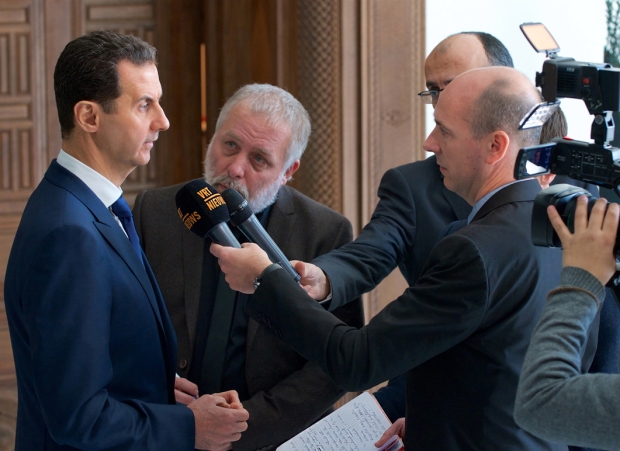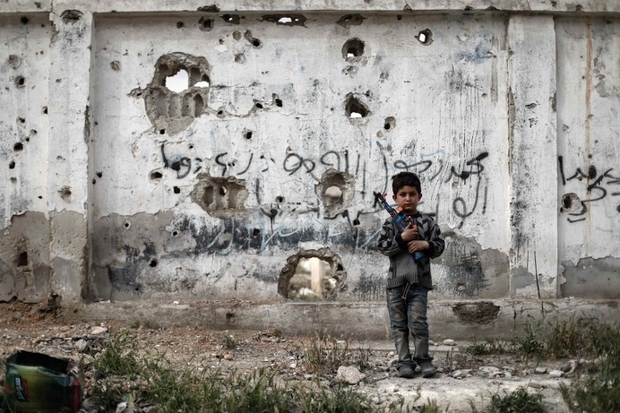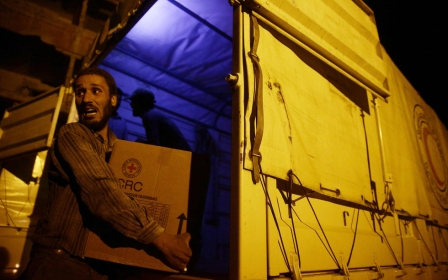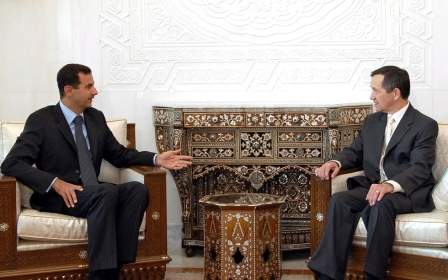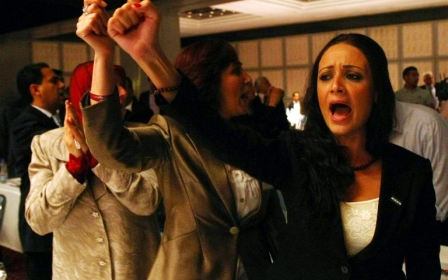How would the West respond if most Syrian rebels were Christians?
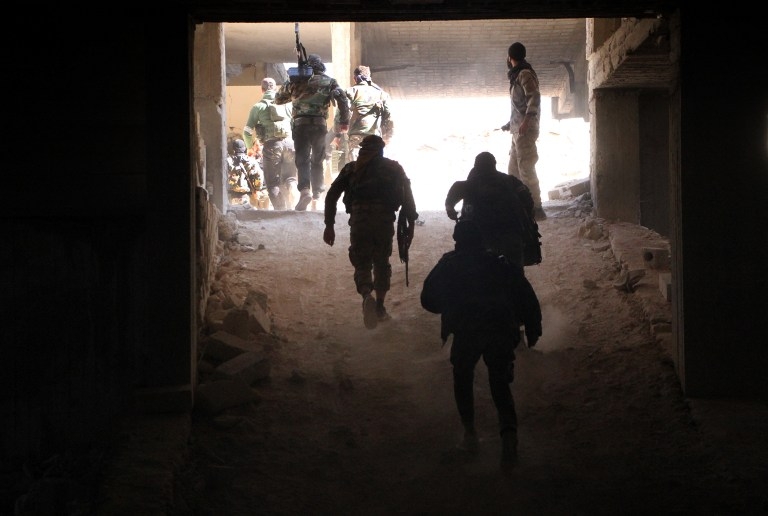
For the better part of five years, the West has been paralysed by its inability to find a "good guy" in the intractable conflict between Assad’s genocidal regime and the now "jihadist-led" rebels, and there’s a very good reason for this: Assad succeeded in conning the West into viewing the conflict through that exact binary lens.
In the Western mind, a secular government can never be the ‘bad guy’ if the alternative is an Islamist militant group
It has been an elaborate con at that. Assad knew the moment he chose to imprison, torture, starve, and murder those who resisted his tyranny instead of hearing out their modest demands for dignity and freedom, the West would not be able to resist the urge to intervene.
After all, the doctrine of “responsibility-to-protect”
So, Assad had to devise a gambit to scare off a Western-led intervention while he got on with the dirty work of murdering his people - more than half a milion have died on all sides in the war so far and counting.
And he calculated that nothing pollutes Western political discourse more effectively than any combination of the words “jihadist,” “Islamic fundamentalist,” or “terrorist”.
The elaborate con
For years, Assad had watched Israeli propagandists undercut Western condemnation of Israel’s atrocities in Gaza by conflating Palestinian resistance with “radical Islam” and by portraying Hamas as the face of the revolution.
Assad preposterously portrayed the peaceful street protest movement as an Islamic terrorist-led conspiracy against him
It’s a ruse Israel has deployed mercilessly to crush three intifadas, and incarcerate two million Gazans in an open-air concentration camp – while earning barely a raised eyebrow from the West. Assad also looked on as the West did nothing as Abdel Fattah al-Sisi overthrew a democratically elected Muslim Brotherhood in Egypt, and then slaughtered hundreds of its political supporters.
But widespread media coverage of the early days of the Syrian revolution made it clear to Western audiences that the nationwide protests against Assad were non-sectarian and secular in nature.
Despite this reality - and despite the fact protesters weren’t even yet demanding regime change - Assad preposterously portrayed the peaceful street protest movement as an Islamic terrorist-led conspiracy against him. And people in the West bought it.
A two-year investigation into the origins of the conflict shows how Assad emptied his prisons of al-Qaeda and Islamist militants of all stripes to stigmatise and delegitimise the revolution in the minds of both Western and domestic audiences.
When media broadcasts showed US weapons ending up in the hands of Islamist groups, Western political leaders lost whatever political goodwill or capital they had to spend in bringing relief to the Syrian people.
Would the West feel so constrained were US weapons ending up in the laps of Christian fundamentalist groups?
In the Western mind, a secular government can never be the "bad guy" if the alternative is an Islamist militant group, no matter how much more depraved the crimes of the former is compared with the latter.
It’s this binary that constrains Western intervention in Syria. It’s this binary that has allowed Assad to murder tens of thousands of his own people, while externally displacing five million Syrians, and internally displacing six million more.
But what if you switch Muslim for Christian?
Would the West feel so constrained were US weapons ending up in the laps of Christian fundamentalist groups? Would the West accept these Christian fundamentalist groups being categorised as terrorist organisations?
And how would Western countries view Christians who travelled to Syria, risking all to defend Syrians from Assad’s barrel bombs and Iran’s militias?
No, no, and "as heroes" are the correct answers.
But Syria isn’t a Christian majority country, and Christian militants do not now lead the rebels. It’s a Muslim majority country and the rebels are now led by Muslim militants.
That's why rather than view them as heroes, we automatically vilify those Muslims who travel to Syria to fight Assad as “terrorists,” strip them of their legal rights and, in some cases, their citizenship. Even Muslims who have traveled to Syria to work for aid agencies have been charged with terrorism.
When you change the identity of the rebels from Islamist to Christian fundamentalist, finding moral clarity suddenly becomes less difficult. Assad is objectively the bad guy in this fight and on the other side just happens to be a religious identity your Western sensibility is uncomfortable with.
How times change. When the Soviet Union was the West’s sworn enemy, the West had little difficulty in identifying Muslim militants as the "good guys" during the Soviet occupation of Afghanistan. “This film is dedicated to the brave Mujahideen of Afghanistan,” read the closing credits to Hollywood's version of the war, Rambo 3.
Reject Assad's gambit
Typically, this is the point in the argument where you send me a YouTube clip of a jihadist rebel group beheading a 14-year-old child, or clips of any number of really despicable things some of the rebels in some of the rebel groups have performed.
What can I say? It’s a war zone, and really despicable people occupy any grouping of individuals. Moreover, your handful of video clips means little in contrast with Assad’s industrial scale slaughter.
The bloodthirsty, nihilistic actions of IS are neither emblematic of jihad, nor of most of the Islamist militant groups scattered among the Syrian rebels
Also, it’s worth noting here that the bloodthirsty, nihilistic actions of the Islamic State (IS) group are neither emblematic of jihad, nor of most of the Islamist militant groups scattered among the Syrian rebels.
Not for a moment am I suggesting that the US or its allies get into bed with al-Qaeda affiliated groups or others.
But like it or not, if you want to stop the killing in Syria and the migrant crisis, while also putting an end to the growth of groups such as IS and al-Qaeda, then what I am suggesting is unavoidable: Islamist militants will have a say in Syria’s future, or whatever national identity or identities come later in the likely and soon-to-be post-war era.
Certainly, there are no easy answers. White House insiders claim that President Obama often referred to Syria as the “ultimate cluster f#ck”. He was right.
But if we want to find real solutions to ending the conflict, we must first reject Assad’s gambit. This is not a choice between supporting Assad and supporting terrorists. This a choice between perpetual war and a quest for peace.
- CJ Werleman is the author of Crucifying America, God Hates You. Hate Him Back, Koran Curious, and is the host of Foreign Object. Follow him on twitter: @cjwerleman
The views expressed in this article belong to the author and do not necessarily reflect the editorial policy of Middle East Eye.
Photo: Rebel fighters from the Jaish al-Fatah (or Army of Conquest) brigades gather in position on 3 November 2016, at an entrance to Aleppo, in the southwestern frontline near the neighbourhood of Dahiyet al-Assad, during a rebel offensive to break a three-month siege of the opposition-held east of Syria's second city (AFP)
This article is available in French on Middle East Eye French edition.
New MEE newsletter: Jerusalem Dispatch
Sign up to get the latest insights and analysis on Israel-Palestine, alongside Turkey Unpacked and other MEE newsletters
Middle East Eye delivers independent and unrivalled coverage and analysis of the Middle East, North Africa and beyond. To learn more about republishing this content and the associated fees, please fill out this form. More about MEE can be found here.



